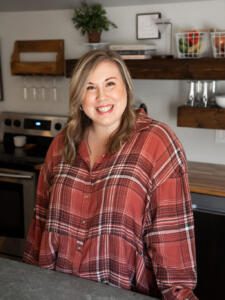Alright y’all, 2022…ready or not, here it comes!
As a Registered Dietitian the New Year feels a lot like my Super Bowl.
There’s SO much information hitting our inboxes and feeds when it comes to nutrition and wellness.
“How many calories you should be eating”
“Calculating the PERFECT macros”
“SUPERFOODS to hijack your METABOLISM”
“The DIET that ACTUALLY works”
Whatever it is you’re seeing, reading, or hearing. I’ve also read it, seen it and heard it. So what is the best way to approach your nutrition and wellness goals this New Year?
When it comes to diets, this is what we know:
- They aren’t individualized, meaning most are a “one size fits all program” that gives you a list of rules to follow for “x” amount of time and then…what? What comes next?
- They don’t set you up for sustainable, long-term habits (which is what science tells us will benefit our health the most…AKA consistency)
- They remove key important nutrients that your body needs to thrive. Whether it’s carbohydrates or fats (one of these is almost always getting a bad rap) they’re called MACROnutrients for a reason: **because our bodies need them to do major functions within our systems that ultimately impact metabolism, hormone production and regulation, energy production, the ability to focus, and so much more**
- They often demonize foods that end up being some of your favorite foods, even your cultural foods. This is problematic for many reasons but I’ll only name a few: when you label foods as “bad” you often will also label yourself as bad for eating them. Your worth is not tied to the food you consume. And the guilt and shame that comes from believing it is can often have a deeper impact on your health than the actual food itself.
- Because diets do not consider your individual needs, you’re often left in a major calorie deficit in which your body will begin to compensate in these ways: slowing your metabolism to hold on to every calorie it can, decreasing your energy so you don’t expend as much (even if you’re working out) so it continues to hold on to what it can, causing hormone disruption, and often increasing feeling out of control around food once you “stop the diet”
Soooo, if a diet isn’t the best idea.. what is?? So happy you asked: here it is!
- Focus on eating enough food each day to support your needs. Don’t skip meals or try to “save” calories…fuel your body! I promise it will thank you and you will be shocked at how good you’ll feel. A good rule of thumb is that if it’s been 3.5 hours or more since you last ate: eat something. Whether that’s your next meal or a balanced snack depends on your unique needs that day.
- Focus on new foods + nutrient dense foods you want to try and add more of in your day to day eating. Maybe you want to eat at least one plant based meal a week? Or work up to eating the recommended 5 servings of fruits and veggies a day? Maybe you want to increase fiber consumption through the foods you eat? Or include more Omega-3 fatty acid foods into your week? Begin to notice your current meals and snacks and then slowly begin to fill the gaps on where you can add supportive nutrients.
- Begin changing your language around food. The only “bad” food you can consume is the food that’s spoiled, moldy, or that’s been sitting out for a little too long at that family cookout. Instead begin to identify your “why” behind the foods you consume. Are your current nutritional habits fostering the outcome you want? Whether that’s more energy, better workouts, community, celebrating your culture, feeling prepared for the week, etc.
- Keep eating your favorite foods: I said what I said. And if you’re not convinced, ask yourself, has trying to eliminate them completely ever worked? If you’re feeling super out of control around certain foods, it may be a good indicator that there’s some healing and making peace with that food that you could benefit from.
Ultimately, the best thing you can do this New Year is to let go of what all the noise tells you to focus on when it comes to nutrition and wellness and begin to identify what YOU want to focus on and why you feel excited to accomplish those goals.
Health is not a “one size fits all”, we each have different areas that need our focus and it’s ok if the habits you enjoy and move your forward look different from the person next to you.
Remember, the best plan, the healthiest plan, is the one that you can sustain long-term. This is the long-game, consistency will always move you forward. The small actions that you ENJOY, done day after day, are the actions that lead to lasting, meaningful change and impact.
Not sure where to start? Working 1:1 with a Registered Dietitian can help you sift through all the information you’ve been consuming and begin to identify what could be beneficial to your individual needs and goals.
I’m currently accepting new clients into my 1:1 nutrition coaching program where we work to let go of the diet mentality and shift focus on taking care of our whole self through balanced, enjoyable and sustainable nutrition habits. I use a non-diet approach that allows you to step away from the numbers and the noise and begin to develop trust when it comes to your body and food choices through individualized nutrition support and habit change.
